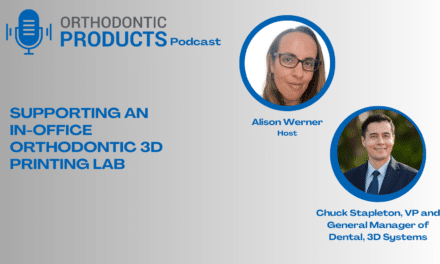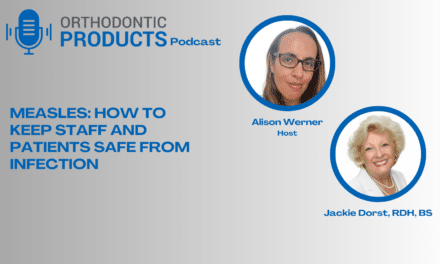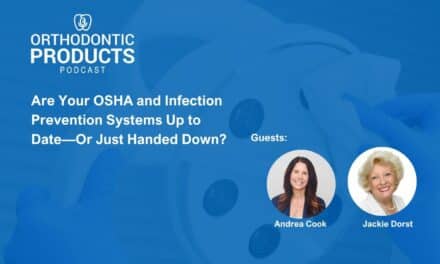Summary: This episode of the Orthodontic Products Podcast explores the support services provided by the College of Diplomates of the American Board of Orthodontics (CDABO) for board certification and ongoing professional development. Jane Wright, DDS, MS, CDABO coucillor, discusses her own experiences with board certification and the resources CDABO offers to orthodontists.
Key Takeaways
- Wright shares her journey to board certification and how her recertification process led her to take part in developing CDABO’s recertification prep-course which is now available in person and online.
- The American Board of Orthodontics and CDABO are completely separate organizations. CDABO provides board-certified orthodontists with significant support, including annual meetings, case displays for residents, and preparation courses for certification and recertification.
- Being board certified enhances an orthodontist’s credibility and confidence, and CDABO membership offers valuable resources for maintaining certification.
This episode of the Orthodontic Products Podcast focuses on the support services offered by the College of Diplomates of the American Board of Orthodontics (CDABO) to help orthodontists during the board certification process and throughout their careers. Hosted by Alison Werner, the podcast features Jane Wright, DDS, MS, a board-certified orthodontist from Crawford and Wright Orthodontics in Kenosha, Wis. Wright, also a member of the CDABO Council, shares her insights on the certification process and the continuous professional support provided by CDABO.
Wright’s Board Certification Journey
The conversation starts with Wright sharing how she joined her father’s practice 13 years ago and how her path to board certification was influenced early on by attending College of Diplomates meetings with her father. She then talks about her initial board certification process and her recent re-certification experience and how the latter led to role in developing a CDABO recertification course to help orthodontists prepare for the 10-year recertification exam. The course, available in-person at the AAO annual meeting or online, is designed to be comprehensive yet concise, covering the necessary research and clinical knowledge to ensure orthodontists are well-prepared.
Understanding ABO and CDABO
Wright clarifies the differences between the American Board of Orthodontics (ABO) and the College of Diplomates of the American Board of Orthodontics. While the ABO handles testing, certification, and recertification, CDABO offers additional support and resources. CDABO organizes an annual meeting with high-caliber lectures and family-friendly activities, provides case displays for residents, and offers preparation courses for both initial certification and recertification.
The CDABO Annual Meeting
The CDABO annual meeting is highlighted as a significant event, offering not only educational lectures but also family-oriented activities. Wright emphasizes the intimate and collegial atmosphere of these meetings, where attendees can interact with leading figures in the field in a casual setting.
Importance of Board Certification
Wright stresses the importance of board certification for orthodontists. She notes that the general public often assumes all orthodontists are board certified, and being certified can enhance an orthodontist’s credibility and confidence. She encourages young orthodontists to pursue board certification to meet the highest standards of their profession. On a daily basis, Wright says being board certified boosts her confidence and informs her clinical decisions. Her involvement in the CDABO Council was inspired by a desire to contribute more actively to the profession and promote the benefits of board certification and CDABO membership.
Joining or Reinstating CDABO Membership
At the end of the episode, Wright explains the process for joining or reinstating membership in CDABO. Orthodontists can contact the CDABO executive director to check their membership status or reinstate it. She highlights the value and affordability of CDABO membership, especially compared to other professional fees. OP
Podcast Transcript
Alison Werner 0:00
Hello and welcome to the orthodontic products podcast. I’m your host. Alison Werner. For this episode, we’re going to talk about board certification and the support services available to you throughout your career to make the process of certification easier and more beneficial to your practice. To talk about this, I’m joined by Dr Jane Wright, a Board Certified orthodontist in private practice at Crawford and Wright Orthodontics in Kenosha, Wisconsin. Dr Wright is also a member of the College of Diplomates of the American Board of Orthodontics Council. Dr Wright, thank you for joining me.
Dr Jane Wright 0:33
Thank you, Alison. I’m happy to be here.
Alison Werner 0:35
Great. So to get started, can you talk about your practice and how long you’ve been practicing?
Dr Jane Wright 0:43
Yes. So I am in practice with my father and I joined him 13 years ago. So we practice together. We have kind of a one and a half doctor sized practice. It’s not a full two doctor practice, but it works really well for both of us to work side by side and in tandem.
Alison Werner 1:01
Oh, cool. So how far into your career did you decide to get board certified?
Dr Jane Wright 1:09
It was kind of my plan all along. I grew up going to college of diplomates meetings with my dad and I, you know, I watched a lot of the board certified orthodontists meet every year. So from early on in residency, I knew it was important to me and some things that I always wanted to do.
Alison Werner 1:28
So can you talk to me about what the process was like for board certification for you?
Dr Jane Wright 1:36
Yes. So when I got board certified, we had to take a written exam, which is the standard today, there’s still the written component to board certification, but I had to prepare six cases with plaster models and traced cephs and fully worked up and little black binders. And I flew down to St Louis and presented them to examiners. So I had that one on one kind of clinical exam aspect. That’s changed a little bit now. And there’s another written test, but it’s a clinical based test that has changed a little bit since when I certified. And we do have to recertify every 10 years, so there’s initial certification, is the written exam. And then, like I said, I had the clinical, actual model exam. So it was a little stressful, maybe a little more prep work on the front end as the exam exists now,
Alison Werner 2:33
Okay, okay, and so you just did your recertification a couple years ago then,
Dr Jane Wright 2:40
Actually just in October.
Alison Werner 2:43
Okay, yeah. So what was that process like for you?
Dr Jane Wright 2:50
I wasn’t sure what to study. Um, it’s a little daunting when you haven’t, you know, been in residency. You’re not fresh out of residency anymore. I’ve been in clinical practice now for I mean, at the time, it was 12 years and I thought, Where do I begin? What do I study? How do I prep for this? There weren’t a lot of resources out there, so I just read a lot. I read a lot of research. I reread my Proffit textbook. Probably a bit overkill. I feel like I did really well on the exam. I feel like what I actually got, but the re-exam was easier than I thought. But maybe because I was over prepared, I don’t know.
Alison Werner 3:28
Okay, okay. Well, the reason I wanted to have you on is because we really wanted to talk about the differences between the American Board of Orthodontics, which is what you do the testing through, and the College of Diplomates of the American Board of Orthodontics. So most orthodontists who are boards, especially the ones who are board certified, are very familiar with the ABO. They handle the testing, the certification, the recertification process, and if orthodontists, once they pass their boards, they will pay a quote, unquote membership fee to keep their ABO board status active. And they also do get resources and patient education materials, tools, their plaques, their certificates. But the College of Diplomates is actually a separate organization and but a lot of board certified orthodontists will think they’re already a member because they’re board certified. So can you explain, as a member of the Council of the College of Diplomates, how does the College of Diplomates come into play, into this process, and what does the organization bring to doctors who are board certified?
Dr Jane Wright 4:25
Yes, and that’s a great question, because that is our biggest hurdle right now, is helping to differentiate ourselves from the American Board of Orthodontics, and really help orthodontists understand the support that we bring and what we can do to help everybody who wants to and already is board certified. So we are, we have an annual meeting, which is probably our biggest event of the whole year. It’s usually in July, and they’re at really amazing locations, cool resorts, places that you wouldn’t necessarily otherwise maybe go to. They’re very family friendly meetings and high caliber lectures. I mean, these are people that have written textbooks. They’re doing the latest research. It’s very evidence based, very research. There’s, you know, it’s not just theorizing or the trendiest new things. They’re really excellent lectures. And so the annual meeting is one thing that we provide all CDABO members. They’re invited to come to this great meeting every year. We also do resident case displays. So we invite the residents to prepare cases, kind of like a mock board exam, almost, where they’re doing little binders full of the cephs and their panos and their treatment plan workups. They bring their models, and we grade them blindly based on the excellence of the case. And then there is an award, and the winning resident gets published in the Journal of Clinical Orthodontics. I believe they are allowed to present their case and it gets published. Another thing that we do is help people prepare for the initial board exam and to, you know, to become board certified, and also the recertification, which is every 10 years. So there are two separate courses that we offer for people as well. So we’re, we’re a fun group, you know? We have the big party, the annual meeting, but also a lot of resources and help throughout the year to become board certified and to help maintain your status.
Alison Werner 6:34
Okay? And actually, you took part in developing that recertification course, because, I’m guessing there’s a lot of orthodontists out there who are already board certified, who, again, assume they’re already members of the College of Diplomates. Can you talk about what that recertification course took to develop and what they can expect from that?
Dr Jane Wright 6:52
Yeah, so we to maintain our board certification status, we have to recertify every 10 years, and fortunately, it’s an exam that we can take online from the comfort of our own homes. The challenge is knowing how to prepare for that and what’s on it. It is a clinically based exam. So you know, if you’re in clinical practice, you really should have no problem, but there are some research based, evidence based questions, so you need to be up to date on the latest research as well. So what I did is I read a lot of systematic reviews and studies, and I reread Proffit and I tried to help summarize this information for orthodontists so that they maybe don’t have to do as extensive preparation as I did for the recertification exam, because I really had no idea what to study. So now we offer a course. It’s a one hour course, and you can either take it in person at the AAO meeting annually, or we’re about to offer a web-based version, a Zoom version, at the end of July. And once again, you know from the comfort of your own home, you can sit and participate in this training so that you’re better prepared for the recertification exam.
Alison Werner 8:05
Okay. And then you mentioned the annual meeting that takes place, and next year is going to be in Colorado Springs, Colorado. You talked a little bit about, you know, how it’s very evidence based in terms of the lectures. What else do those annual meetings offer? Because I know you grew up going to those meetings with your father. So it sounds like it’s a very family focused opportunity, especially since it’s in the summer, when you know a lot of kids are home from school and everything. So can you talk about that aspect of the annual meeting.
Dr Jane Wright 8:37
Yes, well, it is honestly like, I know there’s the old saying, work hard, play hard, but that’s what these meetings are. The lectures are kind of intensive, very informative, morning meetings, morning lectures, but they’re only in the mornings, and then the afternoons are filled with all sorts of fun family activities. You know, they’ll have gondola rides or hot air balloon rides. All these are optional. You can sign up for any activities that you feel like doing tours, depending on what city you’re in, they’ve had pub crawls, so the whole afternoon is usually open to enjoy with your family. But what’s cool is it’s a very small, intimate group of orthodontists, and so we’re literally rubbing elbows and sitting next to some of the leaders in our field as we’re being shuttled from one activity other, or at morning breakfast, you know, I’m sitting across from somebody who wrote the textbook that I used to study, and it’s like, holy cow, I can’t believe we’re just chatting like, this is no big deal. So it’s really a cool, intimate group of not just our peers, but the leaders in our field. So that’s really amazing.
Alison Werner 9:42
Can you talk about, you know, I’m assuming you interact a lot with a lot of orthodontists, especially starting out in their careers. Can you talk about why they should move forward with getting board certified, and then how the College of Diplomates can serve them? Because, you know, you’re starting out; you’re trying to decide if you should devote your resources and your time to getting board certified. Can you talk a little bit about that?
Dr Jane Wright 10:07
Yeah, well, I think the general public assumes that we’re all board certified, and when a patient finds out that it’s not mandatory, they’re actually shocked. I think that that an orthodontist wouldn’t choose to become board certified, and I remember having a physician’s wife come in for an exam with me, and she was questioning, you know, Oh, I see you and your dad are board certified, but isn’t everybody? And I said, No, it’s optional. And her question was, because her husband’s a physician, why wouldn’t everybody just, you know, it almost makes those that are not board certified seem like, not lazy, but just like, Well, why, why wouldn’t everybody become board certified? Almost like there’s a different level or standard of practice. And for me personally, I wanted to meet the highest standard that was set, you know. So if there’s a level of expectation that the ABO sets, I wanted to make sure that I was meeting it or exceeding it. So for me personally, it was really important to become board certified. And I never wanted to be in a position where somebody was comparing me, if I was un board, if I was not board certified, to another board certified orthodontist, saying, why didn’t you do it? I never wanted to have to answer that question. Yeah. So I would encourage any young orthodontist to become board certified, yeah.
Alison Werner 11:23
On a day to day level, back in your office, what does being board certified bring to your practice? You talked about there with a patient who has a husband who or husband who’s a physician, but just on a day to day level, what does it mean for you clinically?
Dr Jane Wright 11:37
Well, I feel more confident knowing that I have knowledge of the most recent research studies, the latest techniques, the lectures that come to us are coming from all over the world. So these are not just US-based lectures and presenters that are coming to speak to us. It really is the cutting edge around the world of what’s going on. And so I come back with a different level of confidence, feeling really good about the choices I’m making for patients and the treatment plans that I’m presenting. But you know, I can also very proudly display my ABO pamphlets in our welcome brochures for patients. And, you know, I’ve got my back on the wall. It just It means a lot to me knowing that I that I’ve done this extra training, and I think it means a lot to my patients as well.
Alison Werner 12:25
Well, I’m actually curious, how did you decide to go beyond just membership in the College of Diplomates and actually join the council?
Dr Jane Wright 12:33
Well, I was asked to join by Ashok Kothari, an orthodontist in Illinois, and I remember when he called me one cold February night and asked me if I would consider being on the council just I was blown away. I mean, I think that my name was probably brought up because of my dad, and people would always see me at meetings. They knew that I grew up coming to College of Diplomate meetings, so they probably knew that I had a vested interest in the College and helping maintain and promote and encourage membership, so that’s probably why I was asked. And I really had to think about it, because, you know, I’m a busy mom and running a practice and full time orthodontist, but it is, it’s, it’s a really powerful, meaningful position, and I really enjoy being on the College Council.
Alison Werner 13:24
For those who are eligible to join the College of Diplomates or who have left their membership lapse, how can they join or get their membership reinstated?
Dr Jane Wright 13:32
Yes. So this is what we’ve noticed has been happening. Is the, you know, the AAO sends out membership fees, saying you need to renew your membership. And then the ABO sends an email saying your membership is due. And even between those two, you start to think, didn’t I just pay this? But then the College of Diplomates send an email saying your membership payment is due, and some of us have support staff or front desk team or spouses that are helping us pay our membership dues, and it’s really easy for these do slip through the cracks. And a lot of active CDABO members have accidentally, you know, been dropped from membership. Not accidental on our side, accidental on their side, where they don’t realize they get renewed. So if you aren’t sure, or if you know for sure you’ve been dropped and you want to renew, you would email our executive director, and it’s just info at cdabo.org, and we can either check on your membership status or reinstate you. And there is, I think, a one year’s like log, almost like a penalty fee to read to be reinstated. But otherwise, our membership fees are phenomenal, especially compared to AAO and a lot of other larger membership fees. So it’s worth it. It’s certainly worth it. Yeah.
Alison Werner 14:55
well, Dr Wright, thank you so much for joining me today and kind of explaining the differences and the importance of board certification, I really appreciate.
Dr Jane Wright 15:02
Absolutely. Thank you for having me.
Alison Werner 15:04
As always. Thank you for joining us. Be sure to subscribe to the Orthodontic Products podcast to keep up with the latest episodes. And be sure to check out orthodonticproductsonline.com to keep up with the latest industry news. Until next time, take care.
Transcribed by https://otter.ai













